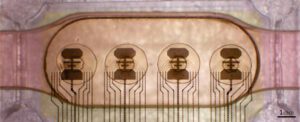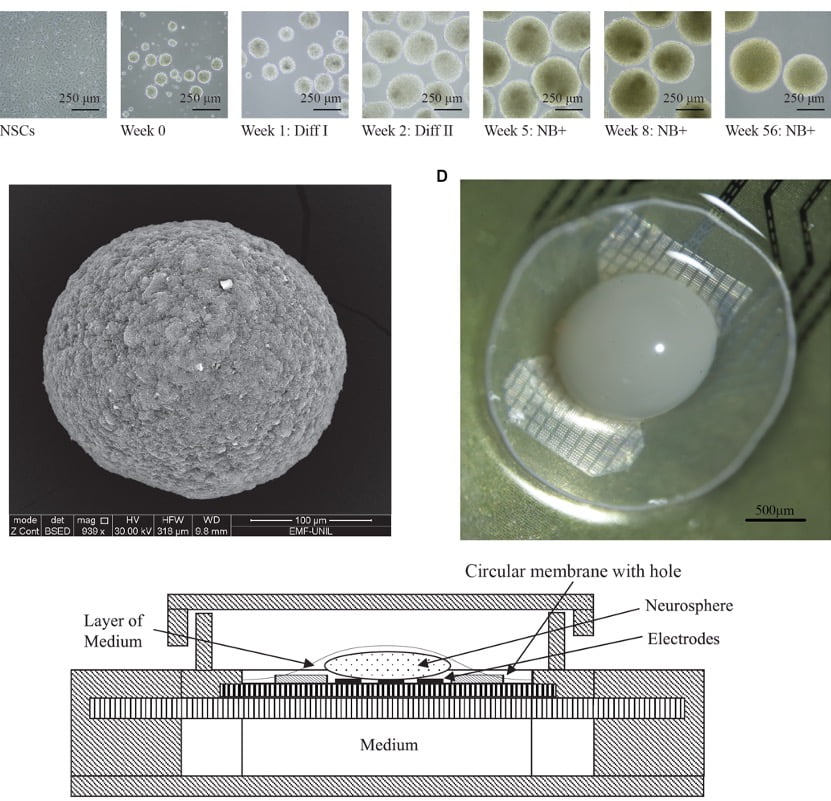ButSpeak.com
News which Matters.

In a groundbreaking step towards energy-efficient computing, Swiss start-up FinalSpark has unveiled a revolutionary biocomputer powered by human brain cells. This innovative device, which integrates living, pulsing brain cells into its system, promises to dramatically reduce the energy consumption associated with traditional computing.
For decades, computer scientists have endeavored to emulate the human brain by creating artificial neural networks with enhanced processing power. However, as these networks become more sophisticated and powerful, their energy demands have surged. FinalSpark’s new biocomputer harnesses nature’s efficiencies to address this challenge, potentially revolutionizing the AI landscape.
FinalSpark’s biocomputer connects to spherical clusters of lab-grown human brain cells, known as organoids. These organoids are housed in an array linked to electrodes and a microfluidics system that provides essential nutrients. This approach, termed wetware computing, leverages the advanced capability to culture organoids in the lab, enabling the study of mini-replicas of human organs.

The company’s platform utilizes 16 organoids connected to 64 electrodes, allowing for precise monitoring and control. The bioprocessors consume significantly less power than traditional digital processors—up to a million times less, according to FinalSpark. This is a stark contrast to the energy-intensive artificial neural networks that underpin large language models like ChatGPT.
To put this in perspective, training a single large language model like GPT-3 requires about 10 gigawatt hours of energy—roughly 6,000 times the annual energy consumption of a European citizen. In comparison, the human brain, with its 86 billion neurons, uses only 0.3 kilowatt hours per day. Given the booming AI industry is projected to consume 3.5% of global electricity by 2030, the environmental implications of such advancements are significant.
FinalSpark’s biocomputer not only aims to reduce energy consumption but also positions itself as a sustainable solution in an industry responsible for about 2% of global CO2 emissions. This innovative technology represents a vital step towards more environmentally friendly computing practices.
FinalSpark is not alone in its pursuit of integrating biological systems with computing. In 2023, US researchers developed a bioprocessor that linked computer hardware to brain organoids, enabling the system to learn speech patterns. FinalSpark’s biocomputer builds on this foundation, offering remote connectivity for researchers and sustaining mini-brains for up to 100 days.
“Over the past three years, the Neuroplatform was utilized with over 1,000 brain organoids, enabling the collection of more than 18 terabytes of data,” said Fred Jordan, co-founder of FinalSpark. The team’s peer-reviewed study emphasizes the potential of this technology for both computing and biomedical research.
Currently, the system is freely available for research purposes, with numerous groups already utilizing it. Future plans include expanding the platform’s capabilities to manage a broader range of experimental protocols, such as injecting molecules and drugs into organoids for testing.
FinalSpark’s biocomputer marks a significant milestone in the intersection of biology and technology. Whether advancing computing efficiency or aiding in organoid research, this innovation opens exciting new possibilities for what can be achieved in the future.